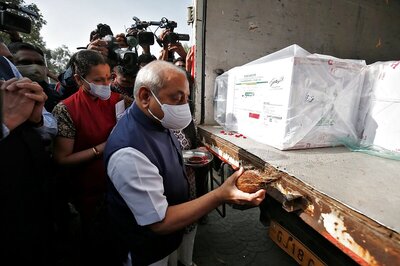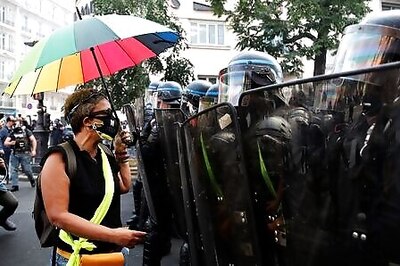
views
Pasadena/California: Seven minutes of terror. It sounds like a Hollywood thriller, but the phrase describes the anxiety NASA is expecting as its car-sized robotic rover tries a tricky landing on Mars late on Sunday.
Skimming the top of the Martian atmosphere at 13,000 mph, the Curiosity rover needs to brake to a stop, in seven minutes.
The rover is headed for a two-year mission to study whether Mars ever had the elements needed for microbial life. Because of its heft, the 2,000-pound robot can't land the way previous spacecraft did. They relied on air bags to cushion a bouncy touchdown. This time NASA is testing a brand new landing that involves gingerly setting down the rover similar to the way heavy-lift helicopters lower huge loads at the end of a cable. How hard is it? "The degree of difficulty is above a 10," says Adam Steltzner, an engineer at NASA's Jet Propulsion Laboratory, which manages the mission.
And American University space policy analyst Howard McCurdy says: "It would be a major technological step forward if it works. It's a big gamble."
A communication time delay between Mars and Earth means Curiosity will have to nail the landing by itself, following the half million lines of computer code that engineers uploaded to direct its every move.
After an 8 1/2-month, 352-million-mile journey, here's a step-by-step look at how Curiosity will land:
-Ten minutes before entering the Martian atmosphere, Curiosity separates from the capsule that carried it to Mars.
-Turning its protective heat shield forward, it streaks through the atmosphere at 13,200 mph, slowing itself with a series of S-curves.
-Seven miles from the ground at 900 mph, Curiosity unfurls its enormous parachute.
- Next it sheds its heat shield and turns on radar to scope out the landing site. Now it's 5 miles from touchdown and closing in at 280 mph.
-A video camera aboard Curiosity starts to record the descent.
-A mile from landing, the parachute is jettisoned.
-Curiosity is still attached to a rocket-powered backpack, and those rockets are used to slow it to less than 2 mph.
-Twelve seconds before landing, nylon cables release and lower Curiosity. Once it senses six wheels on the ground, it cuts the cords. The hovering rocket-powered backpack flies out of the way, crashing some distance away.




















Comments
0 comment